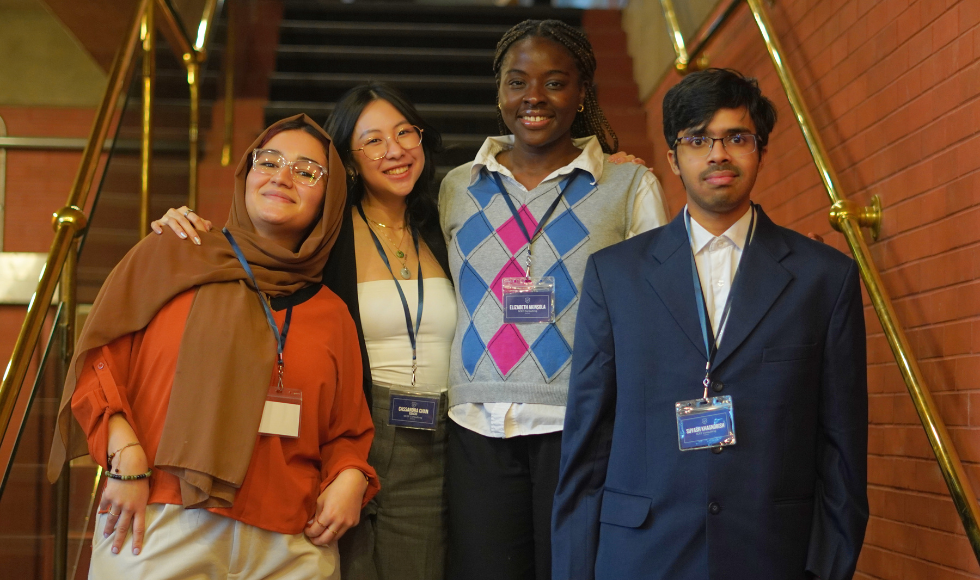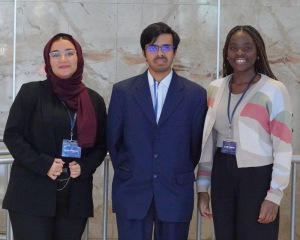Students tackle complex non-profit challenge in 24-hour case competition

(From left to right) Fatemeh Zahirisaransari, Cassandra Chan, Elizabeth Akinsola and Suyash Khasnobish represented McMaster at the Alberta Not-for-Profit Association (ANPA) 2024 External Case Competition in Edmonton in February. (Photo courtesy Elizabeth Akinsola).
An interdisciplinary team of McMaster students recently got a crash course in the not-for-profit sector and picked up practical lessons in teamwork, leadership and effective collaboration along the way.
Undergraduate students Fatemeh Zahirisaransari, Elizabeth Akinsola and Suyash Khasnobish, along with team mentor and graduate student Cassandra Chan represented McMaster at the Alberta Not-for-Profit Association (ANPA) 2024 External Case Competition in February.
Over the course of several days in Edmonton, the group interacted with not-for-profit industry leaders, attended networking events and took on a case competition where they were challenged to create — in only 24 hours — a major business and funding plan for an Alberta registered charity that supports long-term care residents.
“Overall, it was an opportunity to make a tangible difference and inspire the next generation of non-profit leaders in addressing real-world challenges,” says Chan, who is pursuing her master’s in biomedical discovery and commercialization.
The McMaster team was in competition with other delegates and coaches from schools across Canada and around the world, including the Dominican Republic and Mexico.
The students were selected by McMaster’s Student Success Centre, which also serves as an institutional sponsor of the ANPA.
The 24-hour case competition was designed to bring together interdisciplinary teams who could benefit from the diverse skillsets of its student members.

With time ticking, Zahirisaransari, Khasnobish and Akinsola devised a plan to diversify the non-profit’s funding sources, find efficiencies, engage community members, build partnerships and create a unified branding and communication strategy.
“It was a stressful, but exciting moment for all of us,” says Khasnobish, who is in the fourth year of the Software Engineering Technology (B.Tech.) program.
Zahirisaransari says working with her teammates to create the plan, and then to present it to a panel of judges, had a profound impact on her personal growth.
“The 24-hour case competition, although challenging, was an enriching experience,” says the fifth-year student who is working towards her electrical engineering degree with a minor in information systems.
“It pushed me to step out of my comfort zone and develop strong presentation and public speaking skills.”
Akinsola, a second-year nursing student, says she was interested to see how the health sector and non-profit initiatives intersect through community health programs, research and health advocacy.
“Engaging with this case and learning more about non-profit organizations deepened my understanding of the social issues and operational challenges they face on a day-to-day basis,” says Akinsola. “It leads me to feel a sense of commitment and promotes the value of social responsibility.”
The case competition is an example of the many and varied work-integrated learning (WIL) opportunities McMaster students can access to take their learning beyond the lecture hall and apply it to real-world scenarios.
“Work-integrated opportunities, especially those that are a shorter term, can help increase access to experiential learning,” says Anna Magnotta, manager (employment and experiential learning) at the Student Success Centre.
“At McMaster, we provide students diverse opportunities to discover their interests and develop skills, holistically supporting their overall success.”
Chan says her mentees’ performances left her feeling immensely proud, especially since it was the first case competition the three students had participated in.
“It was truly inspiring to witness their dedication, creativity, and resilience in addressing the challenges,” says Chan.
The students all agree the competition was a rewarding experience and though they did not advance to the final round, they say the skills developed and feedback received will serve them well in their individual career aspirations.
As for their advice for other students considering taking on a challenge like this?
“Embrace the learning opportunity, and remember that it requires a lot of teamwork, so be open to diverse perspectives and contribute your unique skills to the team,” says Akinsola.
“Lastly, I would say to take advantage of the networking opportunities provided by the competition, build lasting connections with other delegates, coaches, and professionals, and most importantly, have fun!”
March is Co-operative Education and Work-Integrated Learning month in Canada. Stay tuned to the Daily News and McMaster’s Instagram page for more stories about experiential learning.
Learn more about work integrated learning and how this can support learning beyond the classroom by visiting the Student Success Centre’s website.


